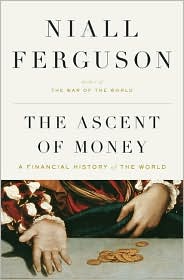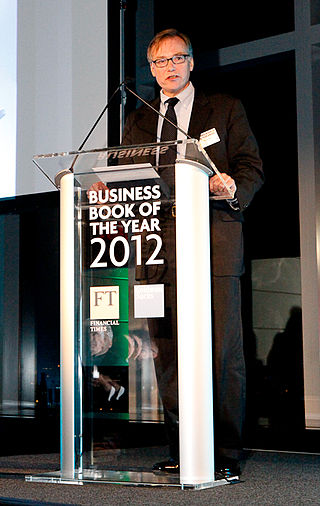
Economic history is the academic learning of economies or economic events of the past. Research is conducted using a combination of historical methods, statistical methods and the application of economic theory to historical situations and institutions. The field can encompass a wide variety of topics, including equality, finance, technology, labour, and business. It emphasizes historicizing the economy itself, analyzing it as a dynamic force and attempting to provide insights into the way it is structured and conceived.

Leon Brittan, Baron Brittan of Spennithorne, was a British Conservative politician and barrister who served as a European Commissioner from 1989 to 1999. As a member of Parliament from 1974 to 1988, he served several ministerial roles in Margaret Thatcher's government, including Home Secretary from 1983 to 1985.

Niall Campbell FergusonFRSE is a Scottish-American historian based in the United States who is the Milbank Family Senior Fellow at the Hoover Institution at Stanford University and a senior fellow at the Belfer Center for Science and International Affairs at Harvard University. Previously, he was a professor at Harvard University, the London School of Economics, New York University, a visiting professor at the New College of the Humanities, and a senior research fellow at Jesus College, Oxford, England.

Roger W. Ferguson Jr. is an American economist, attorney and corporate executive who served as the 17th vice chairmam of the Federal Reserve from 1999 to 2006. Prior to his term as Vice Chairman, Ferguson was appointed as a member of the Federal Reserve Board of Governors in 1997. A member of the Democratic Party, Ferguson was the first African American to hold the post of Vice Chairman. After leaving the Fed, he served as president and CEO of the Teachers Insurance and Annuity Association of America (TIAA) from 2008 to 2021. Ferguson has also been appointed to the board of directors of several companies.

Craig Ferguson is a Scottish-American comedian, actor, writer, and television host. He is best known for hosting the CBS late-night talk show The Late Late Show with Craig Ferguson (2005–2014), for which he won a Peabody Award in 2009 for his interview with South African archbishop Desmond Tutu that year. He also hosted the syndicated game show Celebrity Name Game (2014–2017), for which he won two Daytime Emmy Awards, and Join or Die with Craig Ferguson (2016) on History. In 2017 he released a six-episode web show with his wife, Megan Wallace Cunningham, titled Couple Thinkers.

Charles Henry Ferguson is the founder and president of Representational Pictures, Inc., and director and producer of No End in Sight (2007) and Inside Job (2010), which won the Oscar for Best Documentary Feature. Ferguson is also a software entrepreneur, writer and authority in technology policy.
Sir Samuel Brittan was an English journalist and author. He was the first economics correspondent for the Financial Times, and later a long-time columnist. He was a member of the Academic Advisory Council of the Global Warming Policy Foundation.

Christopher J. Coyne is the F.A. Harper Professor of Economics at George Mason University and the associate director of the F. A. Hayek Program for Advanced Study in Philosophy, Politics, and Economics at the Mercatus Center.

The Ascent of Money: A Financial History of the World is a 2008 book by then-Harvard professor Niall Ferguson, and an adapted television documentary for Channel 4 (UK) and PBS (US), which in 2009 won an International Emmy Award. It examines the long history of money, credit, and banking.

Dambisa Felicia Moyo, Baroness Moyo is a Zambian-born economist and author, known for her analysis of macroeconomics and global affairs. She has written five books, including four New York Times bestsellers: Dead Aid: Why Aid Is Not Working and How There Is a Better Way for Africa (2009), How the West Was Lost: Fifty Years of Economic Folly – And the Stark Choices that Lie Ahead (2011), Winner Take All: China's Race for Resources and What It Means for the World (2012), Edge of Chaos: Why Democracy Is Failing to Deliver Economic Growth – and How to Fix It (2018), and How Boards Work: And How They Can Work Better in a Chaotic World (2021).

Charles Richard Morris was an American lawyer, banker, and author. He wrote fifteen books, and was a regular contributor to the Los Angeles Times, The Wall Street Journal, and The Atlantic Monthly.

Lords of Finance: The Bankers Who Broke the World is a nonfiction book by Liaquat Ahamed about events leading up to and culminating in the Great Depression as told through the personal histories of the heads of the Central Banks of the world's four major economies at the time: Benjamin Strong Jr. of the New York Federal Reserve, Montagu Norman of the Bank of England, Émile Moreau of the Banque de France, and Hjalmar Schacht of the Reichsbank. The text was published on January 22, 2009 by Penguin Press. The book was generally well received by critics and won the 2010 Pulitzer Prize for History. Because the book was published during the midst of the financial crisis of 2007–2010, the book subject matter was seen as very relevant to current financial events.

Financial Times Business Book of the Year Award is an annual award given to the best business book of the year as determined by the Financial Times. It aims to find the book that has 'the most compelling and enjoyable insight into modern business issues'. The award was established in 2005 and is worth £30,000. Beginning in 2010, five short-listed authors each receive £10,000, previously it was £5,000.

Too Big to Fail: The Inside Story of How Wall Street and Washington Fought to Save the Financial System—and Themselves, also known as Too Big to Fail: Inside the Battle to Save Wall Street, is a non-fiction book by Andrew Ross Sorkin chronicling the events of the 2008 financial crisis and the collapse of Lehman Brothers from the point of view of Wall Street CEOs and US government regulators. The book was released on October 20, 2009 by Viking Press.

The 2007–2008 financial crisis, or Global Financial Crisis (GFC), was a severe worldwide economic crisis that occurred in the early 21st century. It was the most serious financial crisis since the Great Depression (1929). Predatory lending targeting low-income homebuyers, excessive risk-taking by global financial institutions, and the bursting of the United States housing bubble culminated in a "perfect storm." Mortgage-backed securities (MBS) tied to American real estate, as well as a vast web of derivatives linked to those MBS, collapsed in value. Financial institutions worldwide suffered severe damage, reaching a climax with the bankruptcy of Lehman Brothers on September 15, 2008, and a subsequent international banking crisis.

Dame Catherine Fiona Woolf, is a British corporate lawyer. She served as the Lord Mayor of London (2013–14), acting as global ambassador for UK-based financial and business services. She has held and still holds many other significant positions in the City of London.

Joseph Brittan, a surgeon, newspaper editor, and provincial councillor, was one of the dominant figures in early Christchurch, New Zealand. Born into a middle-class family in southern England, he followed his younger brother Guise Brittan to Christchurch, where he and his wife arrived in February 1852 with four children. Joseph Brittan soon got involved in the usual activities of early settlers and gained prominence in doing so. He had bought 100 acres on 10 July 1851 and took up 50 of this to the east of Christchurch that he converted to farmland. There, he built the family residence, and the suburb of Linwood was subsequently named after Brittan's farm and homestead of Linwood House.
Political decay is a political theory, originally described by Samuel P. Huntington, which describes how chaos and disorder can arise from social modernization increasing more rapidly than political and institutional modernization. Huntington provides different definitions for political development and describes the forms of political decay according to the various definitions. Huntington focuses primarily on political development as modernization and institutionalization. However, he points to the different definitions of political development as being arbitrary ways to understanding the rise of political systems and the relationship between the political systems in different nations.

The Dictator's Handbook: Why Bad Behavior is Almost Always Good Politics is a 2011 non-fiction book by Bruce Bueno de Mesquita and Alastair Smith, published by the company PublicAffairs. It discusses how politicians gain and retain political power.

The bibliography of Niall Ferguson, a Scottish historian based in the United States who is the Milbank Family Senior Fellow at the Hoover Institution at Stanford University and a Senior Faculty Fellow at the Belfer Center for Science and International Affairs at Harvard University. Previously, he was a professor at Harvard, the London School of Economics and New York University, a visiting professor at the UK New College of the Humanities, and a senior research fellow at Jesus College, Oxford, England.


















